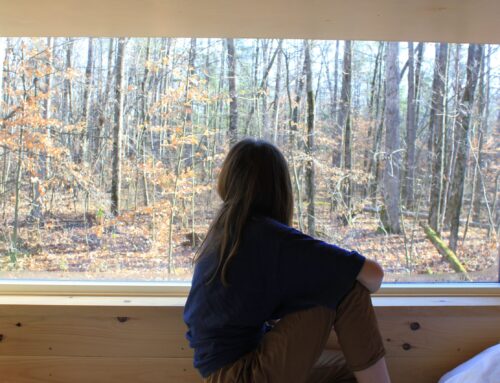
Cleveland Press Collection
I left Cleveland in September of 2012, my car windows steamed and opaque from the panting of two unhappy dogs. I’d practiced my departure for years. When I walked my dogs at dusk, I’d stop and pay attention to the way the tops of the trees reflected the sunset on the lake, to the early glow of the dinner hour in my neighbors’ homes, to the groaning of the big oaks overhead. “Will I remember this moment, this exact moment when I’m gone?” I’d ask myself. I knew I’d leave at some point, and I wanted to memorize Cleveland.
But I couldn’t imagine leaving.
Not that Cleveland had been a destination, at least not until a few months before I arrived. I grew up in California. Ohio was Iowa was Idaho to me—states with an excess of oh and not enough differentiating syllables. But I wound up going to college at Antioch in Yellow Springs, Ohio, dropping out, and then moving to Cleveland in 1972 with a group of radicals and rabble-rousers. We picked Cleveland for our exhortations because it seemed suitably volatile, with all those workers from Ford and Republic Steel and the other factories, all their potential discontent, and all that racial simmer and boil from the 60s. If you have the grandiose notion that you’re going to change the world, it makes sense to go where people have good reason to do so.
[blocktext align=”left”]The factory floors swarmed with accents from around the world and I couldn’t understand anyone at first.[/blocktext]It’s no surprise that I hated my first few years in Cleveland, given that those were the things that drew me. I got a job at the now long-departed Joseph and Feiss plant, operating a fearsome machine that sliced away the excess fabric along the fronts of men’s suit jackets and hammered in a seam, all at the same time. The factory floors swarmed with accents from around the world and I couldn’t understand anyone at first, not even the African-American woman who worked next to me — her speech was so wondrously shaped by inner-city Cleveland that she could have been speaking Croatian or Ukrainian or one of the other languages of the shop floor. We managed to become friends despite my inept ears; she took me to my first and only Browns game and to nightclubs where my husband and I were the only white people and everyone fell all over themselves to make us feel welcome.
But I was supposed to be talking to everyone about Marxism, not football! I was never good at it. I lasted at this job until the radio played “I’ll Be Home For Christmas” on my way to work one morning, and I think I quit that day and begged my parents to fly me back to California for the holidays. I was never so glad to get out of freaking Cleveland.
I worked at a few other factories that are now closed, then delivered my son in a hospital that’s also closed. Had my daughter a few years later in a hospital that is now the size of a small city. Friendships began and accumulated. Traditions followed. I grew to love Cleveland—not just in a fond, sentimental way, now that I’m gone, but as I lived there. I had a good life. And really, 40 years?
The weird thing now is that I don’t miss it much because I don’t feel severed from Cleveland, despite the 2,500-mile gap. Some of this has to do with my own magical thinking. I feel as if my Cleveland friends are always with me, riding around on my shoulders along with my dead mother, still the audience for whom I observe and interpret my life.
[blocktext align=”left”]I feel as if my Cleveland friends are always with me, riding around on my shoulders along with my dead mother, still the audience for whom I observe and interpret my life.[/blocktext]And some of it is that Portland, Oregon, where I now live, feels like Cleveland. It has the same beloved combination of grittiness and extreme green. My California hometown was dry and hot—my bare feet burned on the pavement, my skin cracked–and verdant Ohio felt like balm. I’m not sure why I like the grittiness so much, but I do—the shambling shut-down canneries of my hometown, the hulking ruins of Cleveland’s industrial past, the broad-shouldered, slack-eyed brick buildings near the Willamette River (yes, Portland is another place where a river runs through it). Maybe because all are what’s left of big endeavors that had their day and spent it, leaving the rest of us to cycle up with something new.
Weirdly, I know so many people here in Portland with a Cleveland connection, and not just my daughter and her several friends who moved here (including the entire Chuck’s Diner dynasty). My first morning in my new house, an older woman who pushes a walker around the neighborhood every day, just before the Perry Mason reruns, told me she was from Lakewood. One new friend had a WWLIC (Women Who Lived In Cleveland) party, and there were 15 people there and everyone knew of others. There’s a lot of shared blood.
The end-of-year holidays always make me at least a little sad. I can’t help but remember all the previous iterations of the gatherings, all the faces that used to surround the table who are gone from my life. I didn’t have to listen to the song to know that I wanted to be home for Christmas, to sit again in merriment and sorrow and mundane recitation with my Cleveland friends. The similarities between here and there—real or imagined—just aren’t enough to take me into 2014.
Kristin Ohlson moved to Portland to live in daily proximity to her much adored daughter Jamie, son-in-law James, and grandchildren Holland and Sylvie. What could be better?






Very nice article,essay, brings back my memories. No matter where one moves to the city policics is the same just different names & tactics. Thats why the Arts, Culture & Music are the lasting memories. I sure dont miss the winters though.
I like this essay! I have a brother in Portland who I am sending this to.
I grew up in Cleveland, I lived in Oregon for 22 years, met and married my husband in Portland, one of our unspoken but understood wedding vows was that he would never live in the Midwest. We have been in Lakewood, Ohio for 5 years now and love it with an amazement that only comes when you can not believe how much you are capable of loving something. I expect my kids to travel and probably live elsewhere, but always know their roots run deep in the rustbelt.
Hi Kris,
I thank Pat Wren for sending me your article. We visit Cleveland a lot — my husband grew up in the Heights and we visited the Cleveland Museum and Severance Hall more than similar venues in Pgh where we were living – happy that Cleveland was just 2 hours’ drive away. Now we spend our time here in Portland and Tucson AZ and reminisce about life on the East Coast and friends. I enjoyed your article!
Chris Dauber